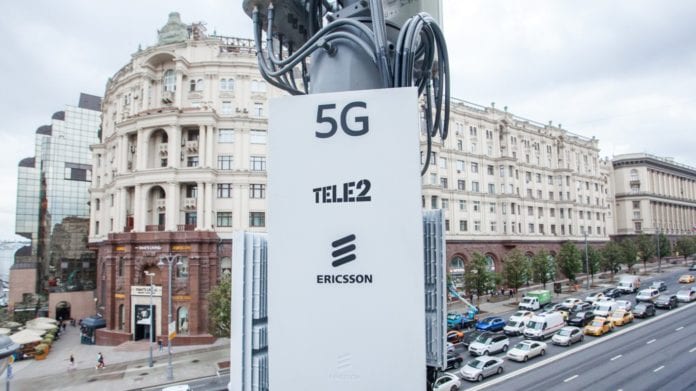Ericsson said it has supported Russian operator Tele2 in upgrading its infrastructure with 25,000 5G-ready base stations across Russia in a 18-month period.
The update, which covers all 27 regions of Russia, has increased capacity and enhanced network performance , the vendor said.
The installation and launch of Ericsson’s base stations on Tele2’s network saw the completion of 50% of the five-year network modernization deal reached during MWC 2019 in Barcelona and follows the first 5G zone in the center of Moscow in August 2019.
“In the Moscow region, from the very start, we installed 5G-ready base stations. We deployed a pilot 5G network in the center of Russia’s capital, and together with Ericsson, we are carrying out a large-scale network modernization across the country. This allows us to say that Tele2 is technologically ready for 5G”, said Aleksey Telkov, CTO at Tele2 Russia.
Sebastian Tolstoy, Head of Ericsson in Russia, said: “Our development enables Tele2’s subscribers the opportunity to use mobile internet services in high quality. As all our network equipment in Russia supports an upgrade to 5G technologies through remote software installation, operators in Russia are able to launch new services as soon as they get the appropriate licenses. Ericsson’s 5G Innovation Hub in Moscow gives Russian service providers the opportunity to test innovations on live 5G and IoT networks. The Ericsson Academy, our training center co-located at the Innovation Hub, trains more than 1,000 specialists from Russian service providers and students each year”.
Tele2 started operations in Russia in 2003 when it launched GSM network in several regions. Tele2 currently has operations in 65 Russian regions including Moscow and Moscow Region.
In March, Russia’s largest communications service provider, MTS, had extended its partnership with Ericsson to include a large-scale network modernization of its 2G/3G/4G infrastructure over large parts of central Russia.
Under the terms of the agreement, Ericsson will supply MTS with Ericsson Radio System products and solutions for modernization of several thousand sites across 16 districts in central Russia. The project will continue until 2026.
Ericsson said that the deployment of these solutions will significantly increase the performance and capacity of MTS’ network, enabling the service provider to quickly deploy 5G coverage and services on existing network infrastructure.
As part of the deal, the vendor will deploy its Spectrum Sharing technology to allow MTS to switch on 5G through remote software installation using existing frequency bands and infrastructure.
Last week, Ericsson announced it had secured the company’s 100th commercial 5G agreement or contract with unique communications service providers. The European vendor said that this figure includes 58 publicly announced contracts and 56 live 5G networks globally.
Some key customers include AT&T, Sprint, T-Mobile US, US Cellular, Verizon, Bell Canada, Telus, Rogers, Swisscom, TDC, Telenor, Vodafone UK, Wind , Deutsche Telkom, O2 UK, Etisalat, Optus, Ooredoo, Orange France, Vodafone UK, STC, KT, SK Telecom and Telstra.

